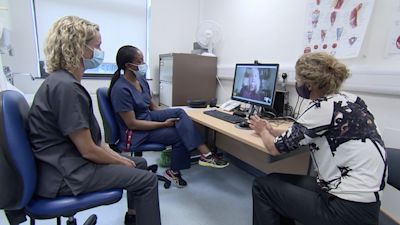Coronavirus: How do you cure those suffering with Long Covid?

When we were right in the middle of the first wave of the coronavirus pandemic all attention was focused on patients suffering from coronavirus. We asked questions about symptoms, contagion, possible treatments, length of hospital stays and crucially numbers of people dying.
As the number of cases has fallen and admissions to hospitals gone down we’re now talking about something else.
Long Covid: What is it, what are the symptoms and what help is there for sufferers?
Coronavirus: Test-and-trace service defended amid cuts to contact tracers
The after affects. What does Covid-19 do to us in the long term?
The worrying thing right now is that we don’t know, but thousands of people are still recovering and suffering chronic affects months after the virus has left their bodies.
I spent the day in Addenbrookes Hospital in Cambridge where a ‘carousel clinic’ has been set up to treat patients who had been admitted to the hospital with coronavirus.
Most had been in intensive care and on ventilators, others were in the acute Covid ward. The patients see a number of consultants, all specialising in different things: physio, respiratory, neurology, intensive care and so on. They have to see so many doctors because the after effects are complex and each one suffers from a number of different things.
The point is hospitals haven’t done this before, they’re making things up as they go along and it’s absolutely necessary that they offer care for those still recovering.
The thing that struck me was that every patient still had issues months after they had left hospital.
Their issues range from shortness of breath, muscle weakness, chronic fatigue, speech problems, pain, nausea and perhaps surprising of all mental health problems.
It’s obvious why someone’s vocal chords might be damaged after being intubated or how muscles remain weak after lack of use for so many weeks but what’s not so obvious is the psychological damage Covid-19 does. One patient spoke of the trauma of coming round in ICU having been on a ventilator for three weeks, the damage caused by not being allowed to see family and the guilt she still has for surviving.
She has problems speaking but the inability to sing is causing her horrific mental anguish.
All these patients need help, they need care now and long into the future.
Each hospital is doing what it can to rehabilitate them but until there is a well trodden path they are learning each day what works best and how best to help them.
Consultants worry they can’t reassure patients that they will return to normal in time, that in itself cause further damage to their well being.
The government has pledged money for rehabilitation and launched an online NHS rehab site but many fear that simply isn’t enough.
There are calls for proper investment in state of the art research centres, rehab clinics and care that matches the severity of the long term affects.
We are only six months into this crisis, the virus is young and there is still an awful lot to learn about what it will do in the months and years to come.